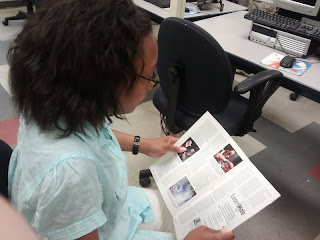 |
| Picture compliments of Dena Moncrief. |
Andrea Nichols blogged:
Lead from any chair. I am a trained classical musician. I attended the University of Southern Maine from 1987-1990. During that time I played for the University of Southern Maine Concert Band and sang with the USM Concert Chorale, while majoring in music education. The conductor of the concert band was(and still is) Dr. Peter Martin and the conductor of the chorale is Dr. Robert Russell. Both still teach and conduct at University of Southern Maine. It was a privilege to play and sing under both of these professors because they have excellent artistic vision as well as non-confrontational approaches to conducting. That’s not to say it wasn’t constantly intimidating to play in their ensembles. I never felt good enough. It’s tough being at the skinny end of the baton. Practices were long and tough. The performances I was exposed to during this time were some of the best live performances of music that I’ve ever heard and, amazingly, I got to take part in them. I love the shiny moment at the end of a piece when the exquisite music stops but the conductor does not lower his hands from conducting, the moment where the audience is transfixed on the performance they just heard and are reluctant to applaud for fear of ruining that moment of awe. But then the conductor lowers his hands, breaking his connection with the ensemble and the applause washes over the musicians bathing them in warming glory.
Questions. This book asks lots of good questions. Question: How much greatness am I willing to offer my students? Answer: About as much as they are willing to take. Why is my team not shining? Why are my students not shining? I plan on asking myself that more often both as a teacher and a team leader.
The book says that nobody has to lead but I’m not so sure about this. Someone always takes the lead. I mentioned in my last blog about the book (and in class) that I like the idea that you can lead from any chair. I think I figured this out as a child because I always wanted to be one of those back up singers (think 1970’s Tina Turner). The back up singers had great costumes, dance moves and their own microphone. They weren’t in the spotlight but they had the greatest harmonies that made the lead singer sound really good. I think it’s funny now, the idea that I was 12 and didn’t want to be the lead singer. Most people want to be the lead singer, but not everyone can (or should) be. It’s usually the people with the biggest egos that need to be the lead singer.
That leads me to Rule Number 6. More specifically: Don’t take yourself so goddamn seriously. That’s funny. I think I need to remember this rule. I take myself way to goddamn seriously. I must be listening to my My Calculating Self. I once went to a counselor in college who made me take this self-analysis test and then told me that I should be an accountant (instead of a school teacher) because I was constantly calculating about life. So true. This calculating mentality can lead to insomnia. I guess this takes us back to Rule Number 6. Chill out, Andrea. Relax.
What would have to change for me to be completely fulfilled? Oh man, where do I start? That may have to be a completely separate blog. How can I take myself less seriously if I have to figure out what I need to be completely fulfilled? Right now I think my answer to that question is more laughter and more sleep. ☺ I think that I get really depressed and downtrodden when my calculating self eclipses my central self. I think that I am generative, prolific and creative but usually way to busy with life to let that flow. This is where my discontent breeds amongst itself. It takes grace to practice Rule Number 6. Rich, compassionate and free, what I want the world to see, my expressive world of the central self.
Presence without resistance.
That’s tough.
Close the gate to escape, denial and blame. Easier said than done.
Emotional heavy lifting. Been there, done A LOT of that.
Clear all judgments. I’m not a judger, I’m one of the judged.
Downward spiral talk excludes possibility.
Sarcasm creates victims but that doesn’t stop anyone, does it?
Start from where you are, not from where you should be. I still need a map.
Make way for passion. I’m passionate about sleep.
My Promise to Myself:
Figure out what’s holding you back and let it go. I’ll try.
Participate wholly. I will.
Life flows when we concentrate on the long lines, the patterns that connect over time.
I’ll look for the long lines.
Phrasing is everything.
@ Andrea
Just by reading your blog, it seems that you have a personal connection with the authors. You can probably relate to the majority of the stories that were talked about. I like how you took what the book offered and related it to what we know. I too would rather be a back-up singer. I’m the one to help make things work behind the scenes. The little things that people don’t pay much attention to but are important. I don’t like being in front.
On another note… It looks like you need to lighten up a little. Life’s too short. Enjoy while you have a chance. Remember, you can’t control everything but you can control YOU!






